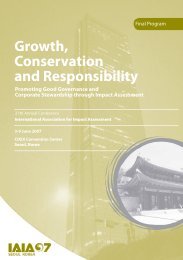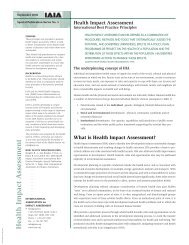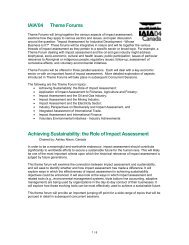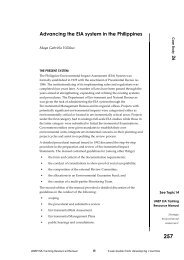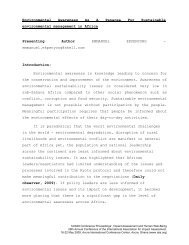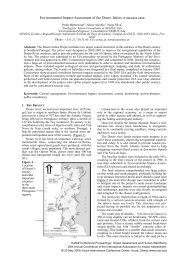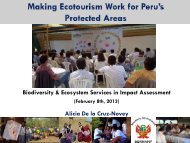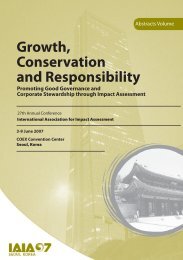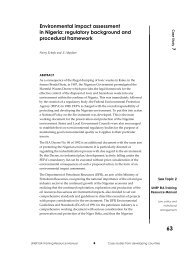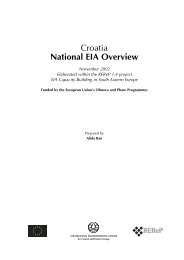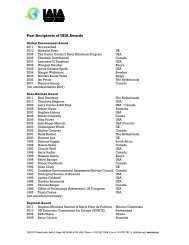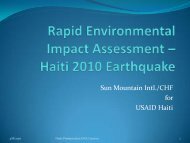Session Report [PDF] - International Association for Impact Assessment
Session Report [PDF] - International Association for Impact Assessment
Session Report [PDF] - International Association for Impact Assessment
You also want an ePaper? Increase the reach of your titles
YUMPU automatically turns print PDFs into web optimized ePapers that Google loves.
28th Annual Meeting of the <strong>International</strong> <strong>Association</strong> <strong>for</strong> <strong>Impact</strong> <strong>Assessment</strong><br />
THE ART AND SCIENCE OF IMPACT ASSESSMENT<br />
IAIA08 <strong>Session</strong> Chair’s <strong>Report</strong><br />
<strong>Session</strong> number and name: TF1.2 Adaptive Risk Management <strong>for</strong> Improving Water<br />
Resource Planning Resilience to Climate Change<br />
Day: Tuesday Date: 6 May, 2008 Time: 1400-1530 # Persons<br />
attending session: 50<br />
Name(s) of <strong>Session</strong> Chair(s):<br />
Stephen Lintner<br />
Contributors: Alessandro Palmieri, Rene Roy, Peter Adamson and Stephen Lintner<br />
(a) Three current issues in application of assessment processes discussed in this<br />
session<br />
- This theme not necessarily IA but more a discussion on how to go from knowing about<br />
climate change to doing something.<br />
- This is the key issue, how do we decide what to do? Can impact assessment help?<br />
-We must currently use an iterative approach (adaptive) as our level of knowledge is not yet<br />
adequate to solve the problems<br />
(b) One or more emerging trends<br />
- Climate change is black and white in the media and newspapers; however it is still very grey<br />
in the minds of the scientists, researchers and those involved in its potential impacts.<br />
- Adaptive management is at the core of dealing with this mater until the knowledge base<br />
increases.<br />
- In terms of understanding climate change impacts, models are still very limited in their<br />
output there<strong>for</strong>e adaptive response models are in place <strong>for</strong> hydro power at the moment.<br />
- There is not one global methodology <strong>for</strong> climate change impacts – they just do not work,<br />
understanding the science will go a long way to understanding the impacts and the role of IA.<br />
- Water projects such as hydro power have a large sensitivity index to climate change and the<br />
effects on changing hydrological regimes. Tools need to be found and used to make these<br />
projects more resilient to effects.<br />
(c) Issues relating to impact assessment effectiveness:<br />
(i) Dimensions of IA effectiveness (i.e. what are the characteristics of effective<br />
IA?)<br />
- Not really covered in this theme as IA not really the key idea behind it.<br />
-However the global knowledge base is not yet at a level where definitive decisions can be<br />
made, adaptiveness is the key.<br />
- <strong>Impact</strong> assessment has a role within climate change issues it needs to figure out where and<br />
how.<br />
- There is a large gap between analysis and decision making due to limitations of models<br />
currently out there.<br />
(ii) challenges/barriers to IA effectiveness<br />
- Knowledge is Power. Until the knowledge of Climate change increases the effectiveness of<br />
the impact identification and magnitude will be somewhat limited and the key idea of ARM<br />
(adaptive risk management) is the most appropriate way <strong>for</strong>ward.<br />
- Currently Models are too simple and there<strong>for</strong>e decision makers can not make accurate<br />
decisions from them. A large gap has been identified. IA can potentially help bridge this gap.<br />
(iii) how these barriers might be overcome<br />
Until more knowledge is gained the only successful approach identified in the <strong>for</strong>um was the
use of Adaptive Management. This risk management approach needs to be nailed down into<br />
tools/instruments and actions so projects effected by climate change become as resilient as<br />
they can. For example – Support Governments into factoring climate concerns into strategic<br />
planning, Mobilise resources <strong>for</strong> better preparatory work and the project level, develop<br />
guidance on selection of the relevant climate scenario to support project planning,<br />
incorporate adaptive management into project design, Integration of the climate issues into<br />
feasibility studies and environmental and social assessments.<br />
As an aside some interesting questions were put to the panel with more of an impact<br />
assessment flavour. How does all this scientific data feed into the decision making process? It<br />
needs to be distilled down from the understanding of the science. Einstein did this well<br />
relativity was a complex theory very few people understand, E=MC 2 is very simple which<br />
many people understand. The climate challenge must work in this way too <strong>for</strong> effective<br />
decision making to take place.<br />
(d) Comments on the Art and Science of <strong>Impact</strong> <strong>Assessment</strong> (i.e. the relative<br />
importance and interplay between science and values/politics/subjectivity in<br />
impact assessment)<br />
The art and science of this issue (climate change) is evolving. People are exploring both via<br />
research and actually ‘doing’. We are beginning to understand through stories and trends. We<br />
have an awareness the major challenge is what do you practically do about it, remembering<br />
that watershed management and hydro power scheme are but only one example of how the<br />
changing climate will affect us. The art and science of impact assessment must explore these<br />
issues and come to terms with them to see where the opportunity lies <strong>for</strong> impact assessors to<br />
help move to the practical application rather than just the theoretical awareness.


![Session Report [PDF] - International Association for Impact Assessment](https://img.yumpu.com/22416140/1/500x640/session-report-pdf-international-association-for-impact-assessment.jpg)
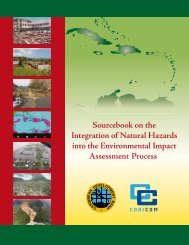
![Session Report [PDF] - International Association for Impact Assessment](https://img.yumpu.com/22416146/1/190x245/session-report-pdf-international-association-for-impact-assessment.jpg?quality=85)
